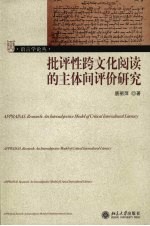图书介绍
批评性跨文化阅读的主体间评价研究【2025|PDF|Epub|mobi|kindle电子书版本百度云盘下载】

- 唐丽萍著 著
- 出版社: 北京:北京大学出版社
- ISBN:7301111126
- 出版时间:2006
- 标注页数:283页
- 文件大小:89MB
- 文件页数:310页
- 主题词:语用学-研究
PDF下载
下载说明
批评性跨文化阅读的主体间评价研究PDF格式电子书版下载
下载的文件为RAR压缩包。需要使用解压软件进行解压得到PDF格式图书。建议使用BT下载工具Free Download Manager进行下载,简称FDM(免费,没有广告,支持多平台)。本站资源全部打包为BT种子。所以需要使用专业的BT下载软件进行下载。如BitComet qBittorrent uTorrent等BT下载工具。迅雷目前由于本站不是热门资源。不推荐使用!后期资源热门了。安装了迅雷也可以迅雷进行下载!
(文件页数 要大于 标注页数,上中下等多册电子书除外)
注意:本站所有压缩包均有解压码: 点击下载压缩包解压工具
图书目录
Chapter 1 Introduction1
1.1 Rationales for the present research1
1.1.1 Educational rationale1
1.1.2 Linguistic rationale4
1.2 Aims of the present research6
1.3 Methodology of the present research7
1.4 Organization of the book7
Chapter 2 Literature Review9
2.1 Introduction9
2.2 The general historical context of globalization9
2.3 Philosophical foundations11
2.3.1 Critical Theory11
2.3.2 Postmodernism/Poststructuralism13
2.3.3 Postcolonialism16
2.3.4 Summary21
2.4 Pedagogical application 1:Critical Literacy22
2.4.1 Evolving definitions of literacy22
2.4.2 Clarification for Critical Thinking and Critical Literacy23
2.4.3 Two key approaches to Critical Literacy25
2.4.4 Summary30
2.5 Pedagogical application 2:Intercultural Communication31
2.5.1 Evolving definitions of culture31
2.5.2 Mainstream pedagogy34
2.5.3 Critical pedagogy34
2.5.4 Summary36
2.6 Critical appraisal of implications for Chinese TEFL reform36
2.6.1 Particular local Chinese context36
2.6.2 Limited literature of critical approaches to TEFL39
2.6.3 Implications for Chinese TEFL reform44
Chapter 3 A Proposed Model for the Present Study46
3.1 Introduction46
3.2 Theoretical foundations for the proposed model46
3.2.1 Critical Discourse Analysis46
3.2.2 Theories of intersubjectivity53
3.2.3 Systemic Functional Linguistics and APPRAISAL theory63
3.2.4 Summary73
3.3 A proposed model for the present study73
3.4 Research design78
3.4.1 Research questions78
3.4.2 A qualitative approach to discourse analysis78
3.4.3 Data collection and selection79
3.5 Summary82
Chapter 4 Naturalizing Readers83
4.1 Introduction83
4.2 Naturalization by ATTITUDE positioning84
4.2.1 CATEGORY85
4.2.2 MODE104
4.2.3 BIAS111
4.2.4 Summary120
4.3 Naturalization by ENGAGEMENT positioning120
4.3.1 MONOGLOSSIA121
4.3.2 DIALOGIC CONTRACTION123
4.3.3 DIALOGIC EXPANSION133
4.3.4 Summary137
4.4 Sample analysis of two full texts137
4.4.1 A sample of a comment138
4.4.2 A sample of a news report149
4.5 Summary158
Chapter 5 Actual Readings160
5.1 Introduction160
5.2 Introducing a methodological concept—"stimulus"161
5.3 Letter dialogues to Text 4.4162
5.3.1 Possible stimuli to be picked up by participants ?A ?E162
5.3.2 Data:Sample analysis164
5.3.3 Statistical analysis179
5.3.4 Discussion181
5.3.5 Summary197
5.4 Letter dialogues to Text 4.6198
5.4.1 Possible stimuli taken up by participants ?F—?J198
5.4.2 Data:Sample analysis200
5.4.3 Statistical analysis214
5.4.4 Discussion215
5.4.5 Summary228
5.5 Pedagogical implications229
5.5.1 Critical intercultural awareness229
5.5.2 APPRAISAL as critical analytical tools231
5.5.3 EFL education as empowering practices234
Chapter 6 Conclusion237
6.1 Major findings of the present study237
6.2 Major contributions of the present study240
6.3 Limitations and further studies243
Appendices245
Appendix A:Media texts245
Appendix B:Letter dialogues to Text 4.4258
Appendix C:Letter dialogues to Text 4.6262
Bibliography266
Figure 3.1:A three-dimensional view of discourse analysis(Fairclough 1992a:10)48
Figure 3.2:Linguistic strata(Martin 1999:38)65
Figure 3.3:Genre,register and language(Martin&Rose 2003:254)65
Figure 3.4:Time frames and semogenesis(Martin&Rose 2003:267)66
Figure 3.5:Language,register and genre as the projection of their semohistory—across time frames(Martin&Rose 2003:269)67
Figure 3.6:APPRAISAL system—an overview(summarized from Martin 2000a;White 2003)70
Figure 3.7:An intersubjective model of CIL74
Figure 3.8:Elaboration of the intersubjective model of CIL76
Figure 4.1:Journalistic voices—first cut(White 1998:125)84
Figure 5.1:Responded frequency of each stimulus picked up by participants ?A—?E180
Figure 5.2:ATTITUDE repositioning in response to each stimulus by participants ?A—?E181
Figure 5.3:Responded frequency of each stimulus picked up by participants ?F—?J214
Figure 5.4:ATTITUDE repositioning in response to each stimulus by participants ?F—?J215
Table 3.1:Metafunctions(Martin 1991:104)64
Table 3.2:Metafunctions and Lexicogrammar(Halliday 1978;Matthiessen 1995)64
Table 4.1:Text-based examples of AFFECT86
Table 4.2:Summary of AFFECT in Example 4.291
Table 4.3:Text-based examples of APPRECIATION92
Table 4.4:Summary of inscribed APPRECIATIONS in Text 4.194
Table 4.5:Text-based examples of JUDGMENT98
Table 4.6:A comparative picture of the JUDGMENTS targeted on Kerry and Bush in Example 4.6115
Table 4.7:Summary of APPRECIATIONS targeted on Hollywood in Text 4.4143
Table 4.8:Summary of the Western representations of the East in Text 4.4145
Table 5.1:Possible stimuli to be picked up from Text 4.4163
Table 5.2:Summary of actual readings taken up by?A167
Table 5.3:Summary of actual readings taken up by?B169
Table 5.4:Summary of actual readings taken up by?C171
Table 5.5:Summary of actual readings taken up by?D174
Table 5.6:Summary of actual readings taken up by?E178
Table 5.7:Possible stimuli to be picked up from Text 4.6199
Table 5.8:Summary of actual readings taken up by?F201
Table 5.9:Summary of actual readings taken up by?G203
Table 5.10:Summary of actual readings taken up by?H206
Table 5.11:Summary of actual readings taken up by?I209
Table 5.12:Summary of actual readings taken up by?J212
热门推荐
- 2986042.html
- 3653265.html
- 839344.html
- 1435380.html
- 3081741.html
- 1901796.html
- 2562118.html
- 3232047.html
- 3431692.html
- 416793.html
- http://www.ickdjs.cc/book_47995.html
- http://www.ickdjs.cc/book_3852456.html
- http://www.ickdjs.cc/book_485832.html
- http://www.ickdjs.cc/book_688355.html
- http://www.ickdjs.cc/book_3063941.html
- http://www.ickdjs.cc/book_3313136.html
- http://www.ickdjs.cc/book_3148580.html
- http://www.ickdjs.cc/book_3299696.html
- http://www.ickdjs.cc/book_1631806.html
- http://www.ickdjs.cc/book_2502535.html